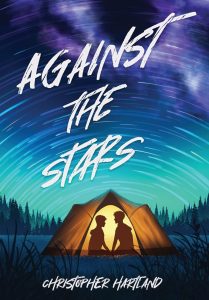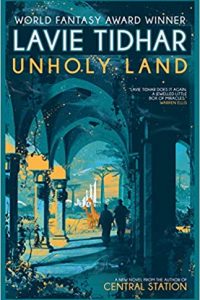Alex Brown Reviews Against the Stars Christopher Hartland
 Against the Stars, Christopher Hartland (Tiny Ghost Press 978-1-91558-503-5, $12.99. 296pp, pb) April 2023.
Against the Stars, Christopher Hartland (Tiny Ghost Press 978-1-91558-503-5, $12.99. 296pp, pb) April 2023.
If you had the chance to see your future, would you take it? What if you saw something unexpected, like that you weren’t the person you thought you were or that your life wasn’t going to go the way you planned? Would you try to change your future or would you lean into it? Is it fate or free will? Debut author Christopher Hartland digs into those questions with his wonderful young-adult science fiction novel Against the Stars.
For years now, GlimpseTech has given customers 45-second peeks into their future. Some people see themselves living an entirely different life from what they do now, some see their lives becoming drastically worse, and some see nothing but darkness. No one sees past a certain date. Is the world about to end, or is something else going on under the surface? Anti-Glimpse protestors see the technology as shackling the public to a prescribed future and denying people choice, and they’ll do anything to prove their case.
Amidst all this are teen boys Seb and Elliot. Years ago, Seb’s parents’ Glimpses shattered their world. His dad left and picked up a new girlfriend, and his mother’s mental health crumbled. Trapped in poverty and unable to see any better possibilities, Seb refuses to get a Glimpse of his own. On his 16th birthday, Elliot got his Glimpse… and saw himself deliriously happy with Seb. Elliot, who up until this point did not think of himself as queer, sets out to see if there might be something to this Glimpse. A romance blooms as trouble brews. Young love collides with dangerous technology.
Against the Stars is one of those young adult novels packed with emotions. If someone isn’t bursting into tears, they’re yelling in rage or beaming with joy. Characters fall in insta-love and make risky, impulsive choices. In other words, they’re typical teenagers. The adult in me wants to roll my eyes at all the high-intensity emotions the characters wade through, but then I remember what an emotional, hormonal mess I was at 17 and, yeah. It’s pretty accurate.
The plot moves quickly, never dwelling on any one emotional beat or action sequence too long. While it doesn’t always work – in particular, the subplots with the boys’ parents probably should have either been expanded or cut – for the most part the pacing flowed perfectly. Hartland had me hooked from the beginning, so much so that I consumed the whole thing in one sitting. The only real drag on the plot was when we switched from Seb and Elliot’s first-person POVs to that of Agent Sigma, one of the anti-Glimpse terrorists. I remain unconvinced that their first-person POV scenes were necessary to the story, and every time that character showed up, all I wanted to do was skip ahead to get back to Elliot and Seb. That could also just be that I liked the two main characters so much that I wanted to spend as much time with them as possible.
Hartland blends a science fiction premise with some big, real themes, including antiqueer and antitrans bigotry, poverty, substance abuse, sex work, what true allyship actually means, and identity exploration. At the root of it all is queerness, in all its beautiful, chaotic, messy diversity. Queerness here doesn’t fit neatly into a box, and labels are a path to discovery rather than a strict definition we must force ourselves to meet.
One of those memes that often goes around social media is ‘‘what would you say to your teenage self,’’ and my answer is always: ‘‘Hey kid, you’re queer, like, hella queer. Yeah, that’s why you feel like shit all the time, because you’re not what you’re pretending to be.’’ The way Hartland sets up Glimpses, Elliot basically gets to experience exactly that. His flash shows him a life he didn’t know he had the option of living. The Glimpse doesn’t make him queer – any more than reading a queer book or being around queer people ‘‘turns’’ people queer, that’s not how being a person works – but it showed him a new possibility. It’s why bigots are banning books. They don’t actually care about the book; they care that people are able to reach for ways of being beyond the cisalloheteronormative white supremacist patriarchy. They want everyone back in their boxes, even if (especially if) that box is more like a prison cell. In Against the Stars, anti-Glimpse people argue that the technology erases free will, but maybe for some people it actually shows the ultimate exercise in free will: choosing to live your truth.
If you, like me, haven’t been able to stop thinking about Adam Silvera’s They Both Die at the End even though you read it years ago, then you’re going to want to check out Christopher Hartland’s Against the Stars. It’s got future-determining technology, lots of queer characters exploring their identities, and is brimming with big feelings.
Alex Brown is a librarian, author, historian, and Hugo-nominated and Ignyte award-winning critic who writes about speculative fiction, young adult fiction, librarianship, and Black history.
This review and more like it in the June 2023 issue of Locus.
 While you are here, please take a moment to support Locus with a one-time or recurring donation. We rely on reader donations to keep the magazine and site going, and would like to keep the site paywall free, but WE NEED YOUR FINANCIAL SUPPORT to continue quality coverage of the science fiction and fantasy field.
While you are here, please take a moment to support Locus with a one-time or recurring donation. We rely on reader donations to keep the magazine and site going, and would like to keep the site paywall free, but WE NEED YOUR FINANCIAL SUPPORT to continue quality coverage of the science fiction and fantasy field.
©Locus Magazine. Copyrighted material may not be republished without permission of LSFF.







